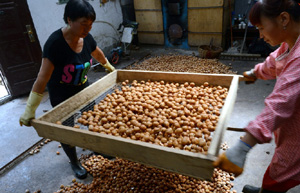BEIJING - The transformation of China's agriculture has attracted great attention in the merger and acquisition (M&A) space and capital markets, consultancy Deloitte said in a new report.
Driven by sharply increasing demand for food products around the world, China's farming sector has seen many new entrants including financial investors who previously had no connections or experience with the industry, according to the report, "Tide of Change -- A whole industry chain approach for modern agriculture."
Capital has become more plentiful in a sector where new technology, know-how and management are much in demand in the perpetual quest for higher productivity at lower cost.
A number of Chinese agricultural giants have made acquisitions both locally and overseas to seek further economies of scale and additional land resources, said the report.
Deloitte's research found that the plantation and livestock sectors have become the key M&A deal drivers in Chinese agriculture.
Some 149 agriculture mergers and acquisitions took place in China between the start of 2007 and the end of 2013. The 114 deals with disclosed values had a total transaction value of $13.7 billion.
Inbound, domestic and outbound M&A transactions were dominated by plantation-related deals, with a proportion of 82 percent, 61 percent and 60 percent respectively in term of transaction volumes in these three markets. Livestock-related deals accounted for 18 percent, 29 percent and 40 percent, respectively.
Patrick Yip, with Deloitte China, said Chinese agricultural companies have become more vertically integrated in the value chain and the integration targets are no longer limited to those in domestic markets.
Asia has traditionally been the most popular region for such Chinese outbound investments, followed by the Americas, Africa, Europe and Australasia, Yip said.
In addition, an increasing number of investors from non-agricultural industries have made investments in local and overseas agricultural sectors through both domestic and cross-border M&A transactions, he noted.
There are three main categories of investors in agriculture -- government-backed investment vehicles (or policy-oriented industrial funds), agricultural enterprises as strategic buyers and financial investors.
The economies of scale and synergy effect of agricultural modernization will move Chinese agriculture up the value chain to create more value for stakeholders in terms of productivity and profitability, Yip forecast.
The fact that there is no shortage of capital in the sector is conducive to its rapid transformation. More deals and larger deals will emerge on the horizon, he said.
The benefits of such transformation could, in the medium to long term, be felt by both Chinese and overseas consumers by way of food products with better quality and at a more competitive cost, the economist added.
|
 |
 |
| Chestnut, peanut and rice farmers of China | Delicate but grueling work |
